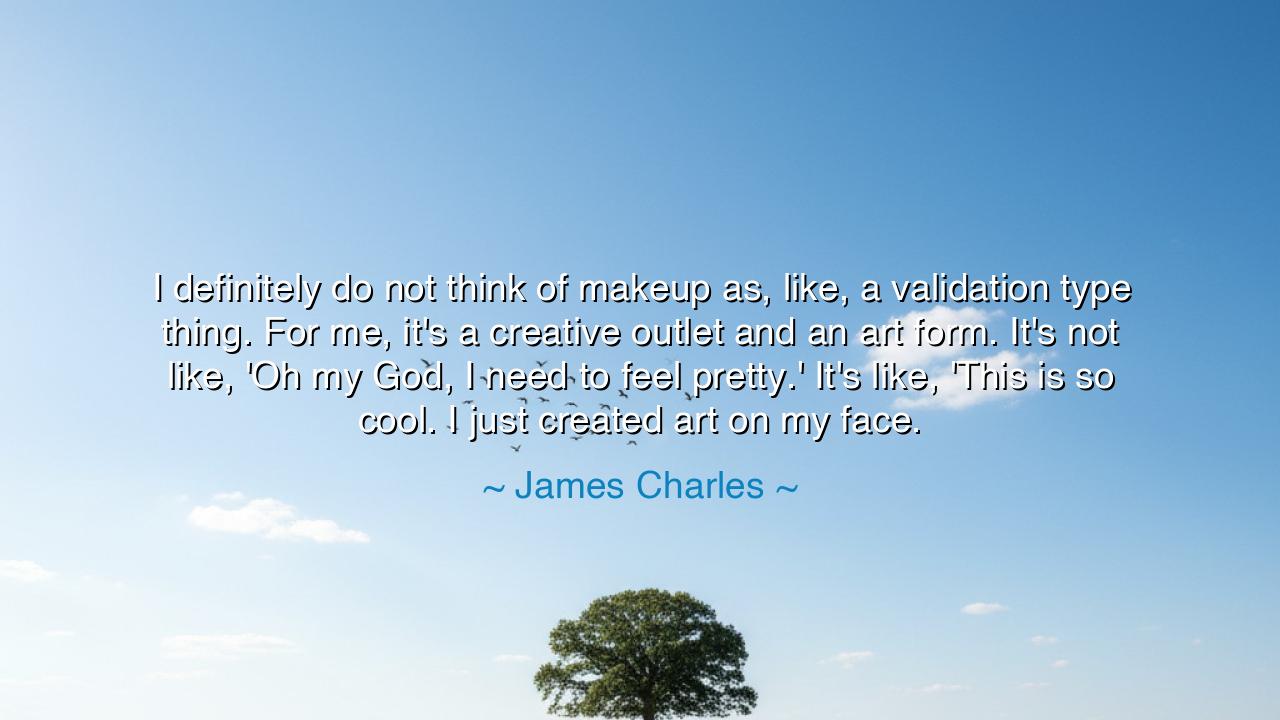
I definitely do not think of makeup as, like, a validation type
I definitely do not think of makeup as, like, a validation type thing. For me, it's a creative outlet and an art form. It's not like, 'Oh my God, I need to feel pretty.' It's like, 'This is so cool. I just created art on my face.






"I definitely do not think of makeup as, like, a validation type thing. For me, it's a creative outlet and an art form. It's not like, 'Oh my God, I need to feel pretty.' It's like, 'This is so cool. I just created art on my face.'" These words from James Charles speak to a profound understanding of the relationship between self-expression, creativity, and beauty. In his reflection, Charles challenges the conventional notion that makeup is merely a tool for conformity or validation, especially in a society that often measures worth by appearance. For him, makeup is not about fitting into beauty standards, but rather about creating something unique and expressing an inner vision. In this way, makeup becomes a medium of artistry, a canvas where the face transforms into an evolving masterpiece.
To truly understand this perspective, we must first recognize the role that creativity plays in human existence. From the dawn of civilization, art has been a means of expressing the invisible, the unspoken, and the unseen. The ancient Greeks understood art as a way to shape the human experience, to transcend the mundane, and to connect with the divine. The sculptures, pottery, and paintings of their time were not mere objects—they were reflections of the soul, capturing the essence of the human condition in a form that could be appreciated by all. Similarly, makeup, when viewed as an art form, transcends superficiality. It becomes a vehicle for the artist’s soul to shine through, a means to redefine and reinvent the self.
Consider the example of Leonardo da Vinci, whose art was not only a means of creating beauty but also a method for exploring the depths of human emotion and perception. The Mona Lisa, one of his most famous works, invites us to look deeper, to perceive more than just the surface. It tells a story of mystery and emotion that transcends the physical. In the same vein, makeup, when approached as an art form, becomes something more than an act of beautification. It becomes a tool for storytelling, for expressing the layers of the human experience. James Charles, through his artistry, encourages us to see the face not just as a place to apply cosmetics, but as a canvas for limitless creativity.
The distinction James Charles makes between using makeup for validation and using it as a creative outlet is crucial. Validation, in this context, refers to the act of seeking external approval through one’s appearance. It is the mindset that beauty is something that must be imposed, shaped by external standards, and validated by the gaze of others. But when makeup is embraced as a form of self-expression, it becomes an act of personal empowerment. The person who applies makeup as art is not looking for external approval but is instead creating something deeply personal—an outward reflection of an internal vision. This process, like any art, becomes a statement of individuality, a bold declaration of freedom from the confines of societal expectation.
In the same way that artists of all kinds seek to push boundaries and create works that challenge the status quo, James Charles redefines the concept of beauty. He does not see makeup as a mere means to enhance the face, but as a tool to transform it, to turn the mundane into something extraordinary. Beauty in his view is not about conforming to idealized standards but about the joy of creating something new and personal. This perspective mirrors the work of avant-garde artists, who seek not to imitate the world but to express their own view of it—through abstract painting, performance art, or conceptual design.
The lesson we can draw from James Charles’ words is profound: true self-expression lies not in conforming to the world’s expectations but in the courage to create and shape our own identity. When we approach life with the mindset of an artist, we are free to explore and reinvent ourselves, to transform the everyday into something extraordinary. This is true not only in the application of makeup but in how we live, work, and interact with the world. Just as an artist is not limited to a single medium, we too can explore various forms of creativity—whether through fashion, words, actions, or art.
In practical terms, this means recognizing that beauty—in all its forms—is subjective and deeply personal. It is a journey of self-discovery, of finding what makes us feel alive, expressive, and true to ourselves. Just as James Charles does with his makeup, we can embrace the power of creativity in our own lives. Whether through writing, drawing, or any other form of artistic expression, we must learn to reclaim beauty as a tool of self-empowerment rather than validation from others. Let us remember that, like any artist, we have the freedom to create, to transform, and to see the world—and ourselves—through a lens of endless possibilities.
In the end, James Charles teaches us that creativity is the most powerful form of self-expression. The face, once seen only as a site for societal judgment, can instead be a canvas where we can reflect our inner selves, explore new ideas, and break free from the conventional. Beauty, in this sense, is not something to be sought externally but something that can be created and transformed from within. Let us all strive to find our own artistry, to see the world and our place in it not as something to conform to, but as something to shape and recreate.






AAdministratorAdministrator
Welcome, honored guests. Please leave a comment, we will respond soon